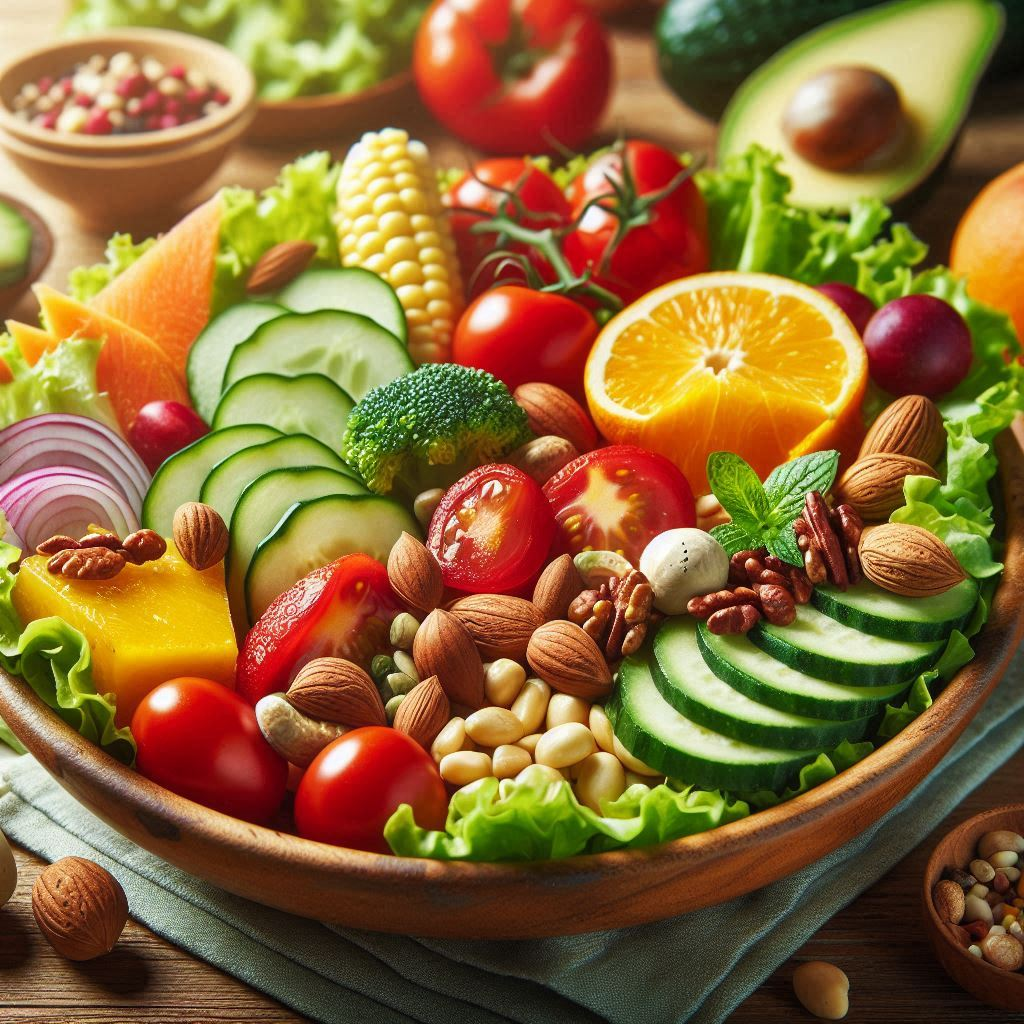
Role of Diet in Colorectal Cancer
Colorectal cancer refers to cancer that starts in the colon (large intestine) or the rectum (the end of the digestive tract). It’s often grouped together because these two parts of the digestive system are connected and share many characteristics.
Early detection through screening, such as colonoscopies, can significantly improve treatment outcomes and survival rates. Treatments may include surgery, radiation therapy, chemotherapy, and targeted therapies, depending on the stage and location of the cancer.
1. Focus on Fiber
- Foods to Include: Whole grains, fruits, vegetables, legumes, and nuts.
- Benefits: Fiber helps maintain bowel regularity and can reduce the risk of colorectal cancer recurrence. However, some people might need to limit fiber intake if they experience gastrointestinal issues.

2. Adequate Protein Intake
- Foods to Include: Lean meats, poultry, fish, eggs, dairy products, legumes, and tofu.
- Benefits: Protein is essential for tissue repair and maintaining muscle mass, especially if undergoing chemotherapy or surgery.
3. Healthy Fats
- Foods to Include: Avocados, nuts, seeds, olive oil, and fatty fish like salmon.
- Benefits: Healthy fats can help with nutrient absorption and provide energy. Omega-3 fatty acids from fish may also have anti-inflammatory properties.
4. Limit Red and Processed Meats
- Why: Some studies suggest that high consumption of red and processed meats may increase the risk of colorectal cancer. Opt for lean meats and plant-based protein sources.
5. Hydration
- Importance: Staying hydrated is crucial, especially if experiencing diarrhea or constipation. Aim to drink plenty of water and consider electrolyte-rich beverages if needed.
6. Manage Symptoms with Food Choices
- For Diarrhea: Eat low-fiber foods such as bananas, white rice, applesauce, and toast.
- For Constipation: Increase fiber intake gradually and drink plenty of fluids. Foods like whole grains, fruits, and vegetables can help.
- For Nausea: Eat small, frequent meals and choose bland foods such as crackers or plain rice.
7. Avoid Excessive Sugar and Refined Carbs
- Why: High sugar and refined carbohydrate intake can contribute to weight gain and other health issues. Focus on whole, unprocessed foods.
8. Limit Alcohol
- Why: Alcohol consumption is associated with an increased risk of colorectal cancer. If consumed, it should be in moderation.
9. Special Considerations Post-Surgery
- For Colostomy or Ileostomy Patients: Follow dietary advice specific to your condition, such as avoiding gas-producing foods or foods that might cause blockages.
Overall, a diet rich in fruits, vegetables, whole grains, and lean proteins, while low in processed foods and red meats, supports general health and can be part of a comprehensive approach to managing colorectal cancer.
Here are some key guidelines for cancer-preventive dietary management:
1. Limit Red and Processed Meats
- Why: High consumption of red meats (such as beef, pork, and lamb) and processed meats (such as bacon, sausages, and hot dogs) has been associated with an increased risk of colorectal cancer and other cancers.
- Alternatives: Opt for lean poultry, fish, and plant-based protein sources like beans, lentils, and tofu.
2. Avoid Excessive Alcohol Consumption
- Why: Alcohol intake is linked to an increased risk of several types of cancer, including breast, liver, and colorectal cancers.
- Guideline: If you choose to drink alcohol, do so in moderation—no more than one drink per day for women and two drinks per day for men.
3. Reduce Intake of Added Sugars and Refined Carbohydrates
- Why: Diets high in added sugars and refined carbs can lead to obesity, which is a risk factor for several cancers. They can also contribute to inflammation and other health issues.
- Alternatives: Focus on whole grains, fruits, and vegetables that provide fiber and essential nutrients.
4. Avoid High-Sodium Foods
- Why: High sodium intake is linked to an increased risk of stomach cancer and can also contribute to other health issues like hypertension.
- Alternatives: Use herbs and spices to flavor foods instead of salt, and choose low-sodium options whenever possible.
5. Limit Consumption of Foods High in Trans Fats and Saturated Fats
- Why: These types of fats can contribute to obesity and inflammation, both of which are associated with an increased cancer risk.
- Alternatives: Choose healthy fats from sources like avocados, nuts, seeds, and olive oil.
6. Avoid Charred and Well-Done Meats
- Why: Cooking meats at high temperatures, especially until they are charred or well-done, can produce carcinogenic compounds.
- Alternatives: Opt for grilling at lower temperatures, or use other cooking methods like baking, steaming, or poaching.
7. Reduce Consumption of Highly Processed Foods

- Why: Highly processed foods often contain unhealthy fats, sugars, and additives that can contribute to cancer risk and overall poor health.
- Alternatives: Focus on fresh, whole foods and prepare meals at home when possible.
8. Limit Intake of Artificial Additives and Preservatives
- Why: Some studies suggest that certain artificial additives and preservatives might be linked to cancer risk.
- Alternatives: Choose natural foods with minimal processing and avoid foods with long lists of artificial ingredients.
9. Avoid Excessive Red Meat and High-fat Dairy Products
- Why: High consumption of red meat and dairy products high in saturated fats can be linked to cancer risk.
- Alternatives: Opt for low-fat or plant-based dairy options and incorporate a variety of plant-based foods.
10. Be Cautious with Certain Supplements
- Why: Some supplements, particularly in high doses, might have an adverse effect on cancer risk.
- Guideline: Consult with a healthcare provider before taking high doses of vitamins or other supplements.
General Recommendations
- Eat a Variety of Fruits and Vegetables: Aim for a diverse range of colors and types to ensure a broad intake of vitamins, minerals, and antioxidants.
- Stay Physically Active: Regular exercise supports a healthy weight and can lower cancer risk.
- Maintain a Healthy Weight: Obesity is a known risk factor for many cancers.











